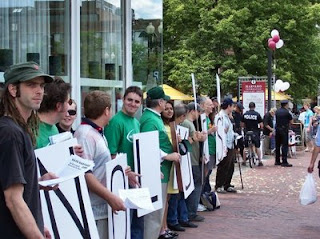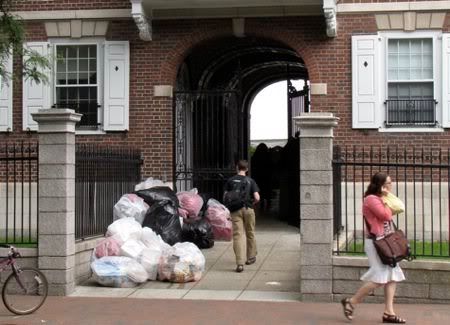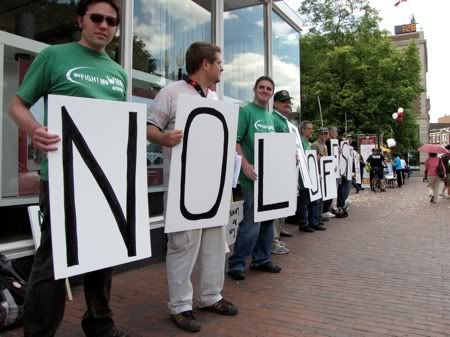Harvard University Workers Demonstrate Against Mass Layoffs

Cambridge, MA - Over 100 unionized Harvard University workers, students and supporters held a campus rally on Thursday in protest of the mass layoff of 275 employees earlier this week - representing 2 percent of Harvard's 16,000-person workforce. Organizers said that as the richest university in the world, with billions of dollars in its endowment, Harvard "owes more to community residents than mass layoffs."
Geoff Carens, a union representative in the Harvard Union of Clerical and Technical Workers, minced few words about the situation on the ground, "I think today's action shows that Harvard's callous efforts to kick workers to the curb is going to bounce back and bite them. We drew a large, noisy crowd of workers, students, faculty, and community members in summer - typically a very tough time to mount a demonstration! The rally was called very quickly as layoffs only started hitting the workers this week. The desperation and panic that many laid-off workers feel seems to be hardening into a determination to fight in many cases.
"We had participation today from activists in Allston-Brighton who have opposed Harvard's take-over of their neighborhood. The number of students who rallied was truly remarkable given that the great majority of them aren't even in town. We even attracted summer school students and high school students. Probably the majority of attendees were clerical union members. Our demonstration struck an important blow for workers' rights on campus, and pointed the way for the future. They say lay off? We say back off!"
The Harvard administration, for their part, indicate that they are doing everything they can to preserve jobs.
Kevin Galvin, director of news and media relations at Harvard said, "Harvard has taken a number of steps to reduce compensation costs, which account for half of our annual operating budget. We have frozen salaries for faculty and non-union staff this year, offered a voluntary early retirement program in which more than 500 employees participated, and strictly limited hiring. Unfortunately, we are facing a projected 30 percent decline in our endowment, and those steps did not generate the savings we needed to achieve in order to avoid the reduction in force that was announced this week.
"University officials have worked closely with the unions representing workers at Harvard to provide them with relevant information about the financial challenges that the schools and the central administration are facing, and to offer them opportunities to suggest alternatives to layoffs. By the time the process is complete, it will have included about 75 impact bargaining sessions over more than four weeks.
"Our staff reductions have been spread evenly across our workforce. The average participant in the Voluntary Early Retirement Plan had an annual salary of $67,000, and about half the participants were hourly employees and half were exempt administrative and professional staff. Again with the reduction in force announced Tuesday, about half of the positions eliminated are administrative or professional positions and almost all of the remaining positions are clerical or technical jobs. Service and trade workers will be largely unaffected."
Carens remains undeterred by such arguments, "Harvard's riches, high profile and marked tendency to act like a rapacious corporation will make it a magnet for bad PR, and larger and larger actions like the one we held today. I wouldn't be at all surprised if much more dramatic initiatives follow in the coming months. What the oligarchs of the Harvard Corporation, and Goldman-Sachs, don't realize is that they are helping to forge a steely coalition of union members, unorganized workers, students, professors, and residents."
Rally organizers plan to call further actions against Harvard's layoff in the coming weeks.
The event was peaceful with a light presence of Harvard Police. There were no arrests.










